Only a third of citizens would vote for Serbias entry into the EU, while 51 percent would vote against it, according to the results of the latest Demostat survey, which showed that the attitude of public opinion towards the issue is the same as the attitude of the government and its media towards the EU. Such a mood of public opinion, which is largely a consequence of the pro-Russian narrative in Serbia, could be changed in the short term by the countrys president and the leader of the largest party, Aleksandar Vucic, Demostat interlocutors agree. This requires a clear decision by Vu?i?, a change in the narrative in the pro-government media, as well as the engagement of the party infrastructure and pro-Vucic-oriented representatives of the political and social elite.
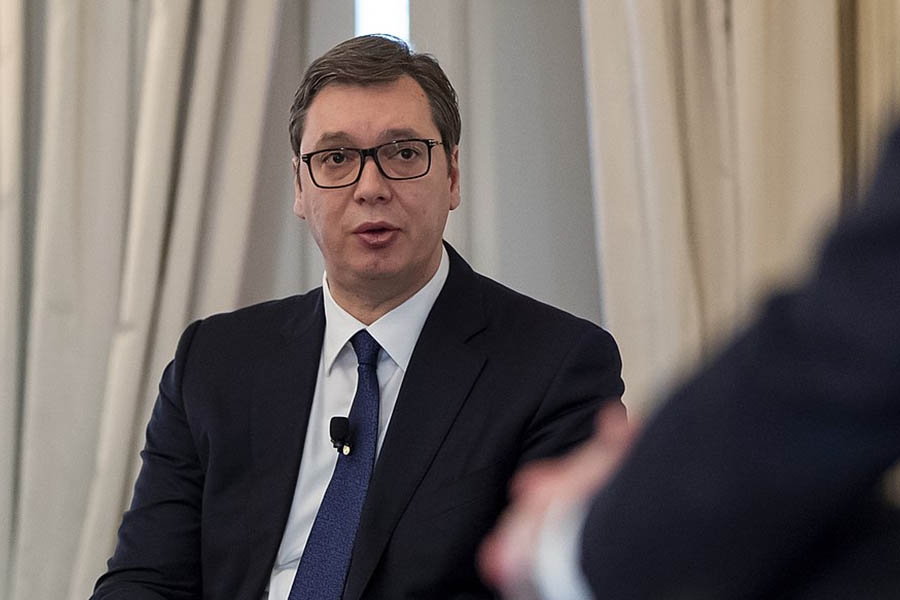
Only a third of citizens would vote for Serbias entry into the EU, while 51 percent would vote against it, according to the results of the latest Demostat survey, which showed that the attitude of public opinion towards the issue is the same as the attitude of the government and its media towards the EU. Such a mood of public opinion, which is largely a consequence of the pro-Russian narrative in Serbia, could be changed in the short term by the countrys president and the leader of the largest party, Aleksandar Vucic, Demostat interlocutors agree. This requires a clear decision by Vu?i?, a change in the narrative in the pro-government media, as well as the engagement of the party infrastructure and pro-Vucic-oriented representatives of the political and social elite.

Demostat chief researcher Srecko Mihailovic is convinced that the president of Serbia can change the orientation of citizens towards the EU to a large extent in a short period, noting that European Union officials were also hoping for that. Mihailovic explains his claim by the fact that research shows a strong attachment of a part of progressive supporters to Vucic.
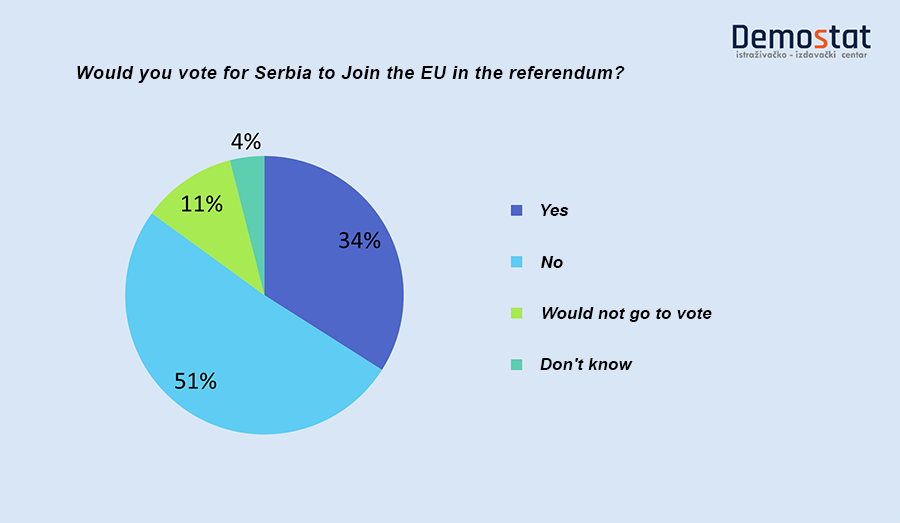
"He is the first man of Serbia, the kind of leader Serbia needs and they are ready to listen to him." This is evidenced by a seemingly banal example. Namely, in last years research, we came across information that about 15 percent are ready to receive a vaccine against the coronavirus if requested or recommended by Vucic. This willingness of citizens to listen to Vucic even when it comes to life is an indicator of the deep attachment of a part of Serbian citizens to Aleksandar Vucic", said Mihailovic.
But, as Mihailovic adds, it is not only a matter of a personal relationship, or "private relationship" between a supporter in love and the object of his infatuation, but also of the fact that Vucic owns the Serbian Progressive Party, which is his extended arm. By engaging the Serbian Progressive Party (SNS) and the party infrastructure, which is very strong, Vucic can indirectly influence public opinion.
Mihailovic concludes that changing public opinion requires a triad consisting of Vucic, the media sympathetic to him, and the progressive party machinery.
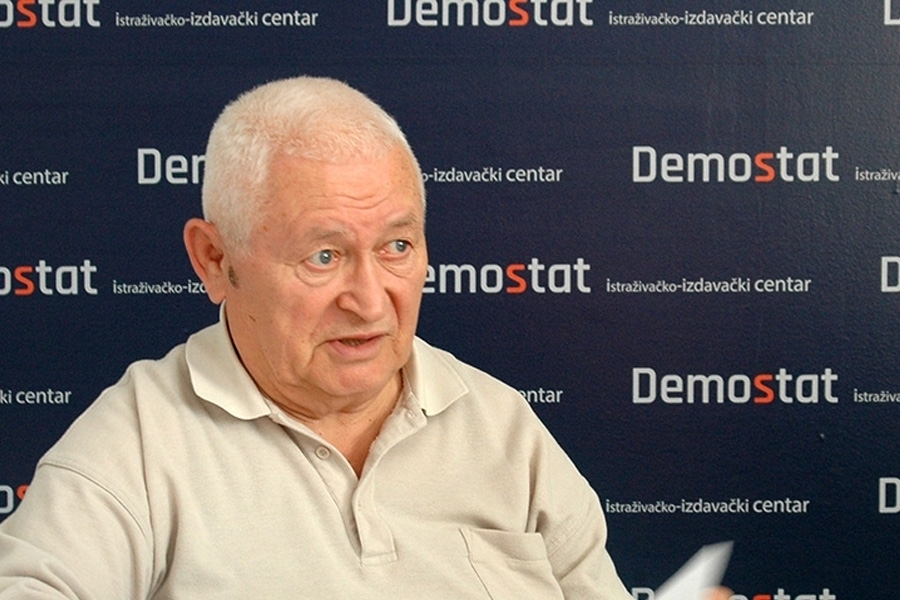
Foto: Demostat
"I could not say how long it would take him to change, but it is certainly neither a very short nor a very long period." It is necessary to start the whole machinery composed of Vucics will, his party, and his media, with the involvement of individuals from the political and social elite in Serbia who are on Vucics side"; Mihailovic said.
He reminds us that an important characteristic of Serbian foreign policy is the consciously generated confusion in public opinion, which perceives Serbias foreign policy as standing between East and West or a continuation of the non-aligned policy of the former Yugoslavia.
"That confusion was introduced into public opinion by those who were in power after 1990, consciously not wanting to choose one side, but counting on the fact that a cuddly lamb will be able to suckle two sheep, which certainly cannot be realized at the moment. "Probably force will force Vucic and his party, and then the citizens of Serbia, to make a decision, because delaying the solution has its end," said Mihailovic.
According to Demostats survey, more than half of respondents, 56 percent of them, believe that Serbia should not harmonize its foreign policy with EU policy, while the vast majority of respondents, 80 percent, believe that Serbia should not impose sanctions on Russia. Also, 81 percent of respondents believe that Serbia should preserve its neutrality at all costs.
And although these data sound discouraging for pro-European-oriented citizens, Demostat program director Zoran Panovic believes that the Serbian president can influence their change.
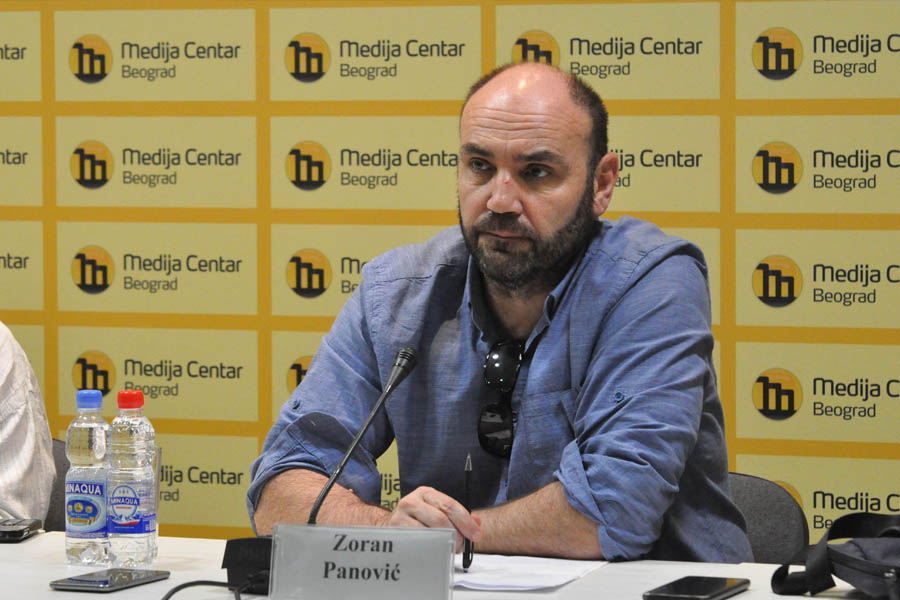
Foto: Medija centar Beograd
The technology of Vucics government and his "catch-all" system, which includes the SNS as a party and a public circle outside the party, implies strong pro-European and even pro-NATO elements, notes Panovic. He says that such elements are not the majority compared to the traditional Russophile-radical mood, but they are not negligible either.
"In certain developments, these would be sufficient resources to start changing the minds of public opinion," says Panovic. He believes that a good part of the so-called Russophile Vucic voters is conformist in their souls and that they would certainly, in the version of ten times better life offered by Vucic, "sacrifice" Russia and quickly accept the new policy.
Vucic can bring about such a change very quickly because there are already resources for that, says Panovic and reminds us that Serbia already has good relations with the West to a large extent due to its economic policy.
Recalling that after Dayton, Slobodan Milosevic won over a good part of his voters and even purged a hard nationalist current from the Socialist Party of Serbia (SPS), Panovic says that Vucic would not have needed to clean up a new current in the SNS, because it would not have appeared.
When asked why Vucic has not already opted for "pro-European public opinion", Panovic states that he is currently satisfied with Boris Tadics current four-pillar policy, which he even brought to the level of the main doctrine, as well as Vojislav Kostunicas doctrine on Serbias military neutrality.
The question of all questions is whether there is a will to change public opinion in favor of the European Union, according to the executive director of Beta, Zlata Kures. She states that the pro-Russian narrative in Serbia has been very present in recent years, stronger and more noticeable than others and that a clear decision by Vucic is needed to change it.
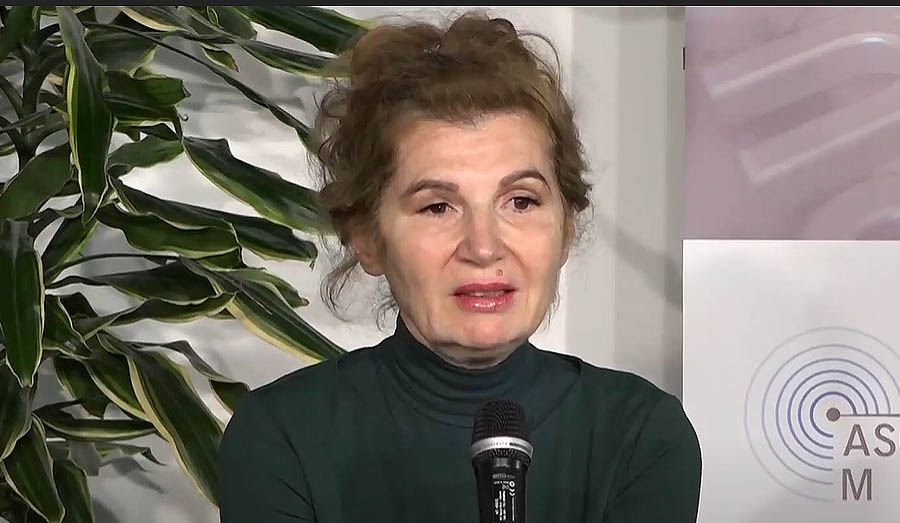
Foto: Printscrren Youtube
"It cannot happen overnight, a certain period is needed. However, from today until the next year, I believe that those narratives could change", she points out.
He adds that surveys in earlier years showed a greater commitment of citizens to the EU, but that in the meantime, citizens were strongly influenced by the events in Ukraine and certain narratives that were present in public opinion.
"This is also shown by the Demostat survey, that Vladimir Putin is the most popular politician in Serbia, with a percentage less than that of Aleksandar Vucic," says Kures.
Such narratives are dictated by the media, which implements government and state policy, Kures points out. She states that a television station with a national frequency promotes the invasion of an independent country, Ukraine, as some kind of pro-Russian event.
Kures, however, states that the European Union also realized that it is necessary to strengthen the promotion of European values in Serbia and that this is clearly visible through the messages that are sent.
He points out that a significant change is also registered in the Demostat survey, which shows for the first time that citizens are aware that the EU invests the most in Serbia and gives the most grants.
In all societies there are issues that are rather being skipped. Certain...
The neoliberal path, started in 2001, has led to especially bad results in Serbi...
For centuries, the region was subsumed within the Ottoman and Hungarian Empires,...
"Serbia has returned to the systemic and anti-systemic position of the political...
In reality, Serbia is closer than ever to NATO. In the course of the last five y...